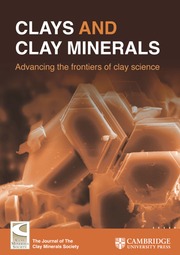Article contents
Characterization of Microbially Fe(III)-Reduced Nontronite: Environmental Cell-Transmission Electron Microscopy Study
Published online by Cambridge University Press: 01 January 2024
Abstract
Microstructural changes induced by the microbial reduction of Fe(III) in nontronite by Shewanella oneidensis were studied using environmental cell (EC)-transmission electron microscopy (TEM), conventional TEM, and X-ray powder diffraction (XRD). Direct observations of clays by EC-TEM in their hydrated state allowed for the first time an accurate and unambiguous TEM measurement of basal layer spacings and the contraction of layer spacing caused by microbial effects, most likely those of Fe(III) reduction. Non-reduced and Fe(III)-reduced nontronite, observed by EC-TEM, exhibited fringes with mean d001 spacings of 1.50 nm (standard deviation, σ = 0.08 nm) and 1.26 nm (σ = 0.10 nm), respectively. In comparison, the same samples embedded with Nanoplast resin, sectioned by microtome, and observed using conventional TEM, displayed layer spacings of 1.0–1.1 nm (non-reduced) and 1.0 nm (reduced). The results from Nanoplast-embedded samples are typical of conventional TEM studies, which have measured nearly identical layer spacings regardless of Fe oxidation state. Following Fe(III) reduction, both EC- and conventional TEM showed an increase in the order of nontronite selected area electron diffraction patterns while the images exhibited fewer wavy fringes and fewer layer terminations. An increase in stacking order in reduced nontronite was also suggested by XRD measurements. In particular, the ratio of the valley to peak intensity (v/p) of the 1.7 nm basal 001 peak of ethylene glycolated nontronite was measured at 0.65 (non-reduced) and 0.85 (microbially reduced).
- Type
- Research Article
- Information
- Copyright
- Copyright © 2003, The Clay Minerals Society
References
- 24
- Cited by


